'American Nightmare': Reporter contacted by Denise Huskins' kidnapper reflects on "bizarre" case
Full episode: The real ‘American Nightmare’ story
Netflix’s new "American Nightmare" docuseries takes a look at the Denise Huskins kidnapping case. In this full LiveNOW & Then episode, crime reporter Henry Lee, recalls what it was like when he received anonymous emails from the kidnapper.
Henry Lee was a reporter for the San Francisco Chronicle in March 2015 when he received an email that claimed to provide "proof of life" for Denise Huskins, a woman abducted from her boyfriend’s home in California, and still missing at the time.
In the audio recording, a woman’s voice could be heard: "My name is Denise Huskins. I am kidnapped -- otherwise, I'm fine."
"Earlier today, there was a plane crash in Alps and 158 people died," the voice continued. "And one thing that people know about me is that I went to my first concert, me and my mom, to Blink 182 [last word inaudible]."
Huskins’ disappearance was covered by many news outlets at the time. Lee, now a crime reporter at KTVU, told FOX Television Stations he was floored by the email and thought it may have been a prank.
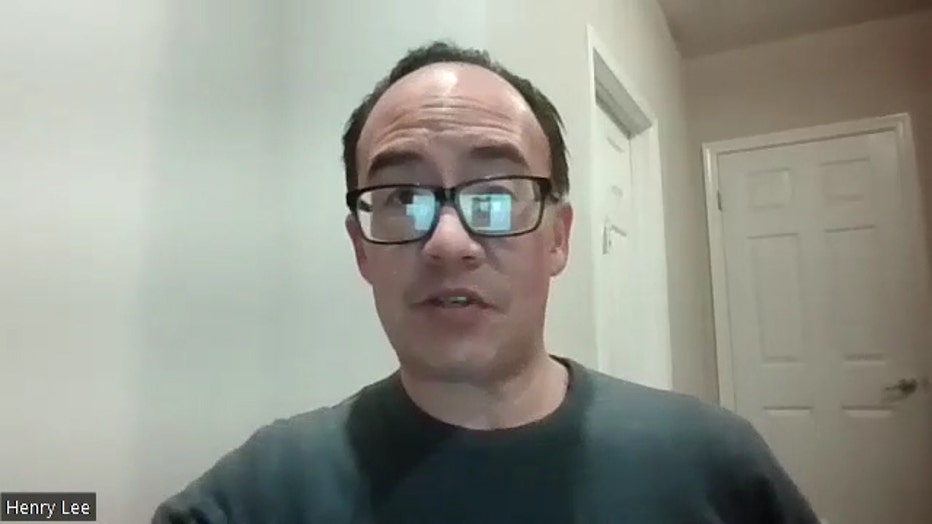
Henry Lee, now a crime reporter at KTVU in San Francisco, was contacted by the kidnapper using an anonymous email while Denise Huskins was missing, and later after she was publicly accused of faking the ordeal. (Credit: FOX Television Stations)
"I'm looking around, there's all these other media folks and friendly competition there," he recalled of the moment he received the audio file. "Why would someone send this to me? It would be a cruel prank if it wasn't her. But if it is her, what are the odds?"
"I was completely flabbergasted," he added.
The terrifying ordeal was featured in a new Netflix docuseries, called "American Nightmare," which included Lee and others central to the case.
Denise Huskins' kidnapping: What happened?
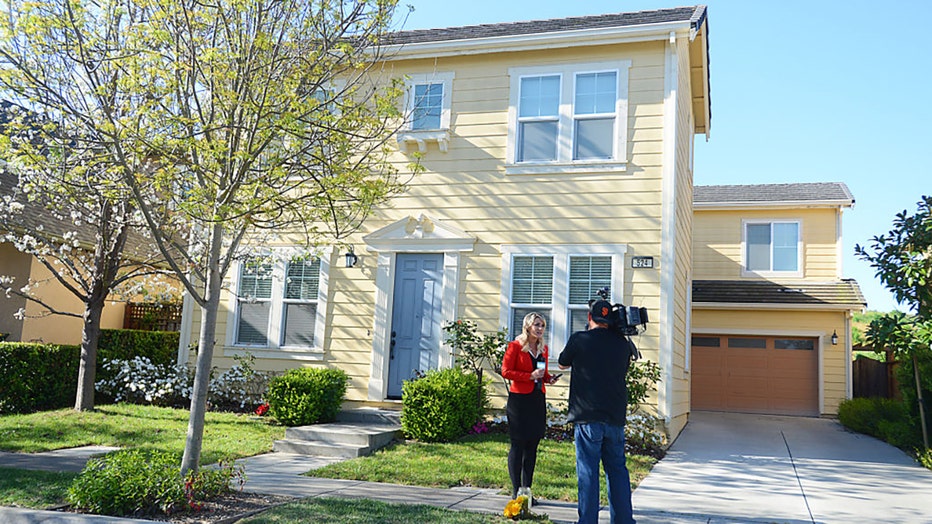
Media report on the abduction of Denise Huskins in front of the home she was taken from on Mare Island on March 24, 2015, in Vallejo, Calif. (Photo by Chris Riley/MediaNews Group/Vallejo Times Herald via Getty Images)
On March 23, 2015, Huskins was kidnapped by a masked intruder who broke into a home in Vallejo, a city in the San Francisco Bay Area.
Her boyfriend, Aaron Quinn, told detectives that he woke up to a bright light on his face and that intruders had drugged, blindfolded and tied both of them up before forcefully taking Huskins in the middle of the night. Quinn also told police that the kidnappers were demanding an $8,500 ransom.
A Vallejo police detective interrogated Quinn for hours, at times suggesting he may have been involved in Huskins’ disappearance. Quinn took a polygraph test which an FBI agent told him he failed, the couple said later in a book about their ordeal.
Huskins, who was 29 at the time, turned up unharmed two days later more than 400 miles away. She said she was dropped off outside her father’s apartment in Huntington Beach, a city in Southern California.
The same day, the Vallejo Police Department held a news conference and told the media how they had found no evidence of a kidnapping and called it a hoax.
At the news conference, Vallejo Police Department spokesman Kenny Park expressed disgust over the resources supposedly squandered during the search, with 40 detectives assigned to the case, and the fear it caused among the community.
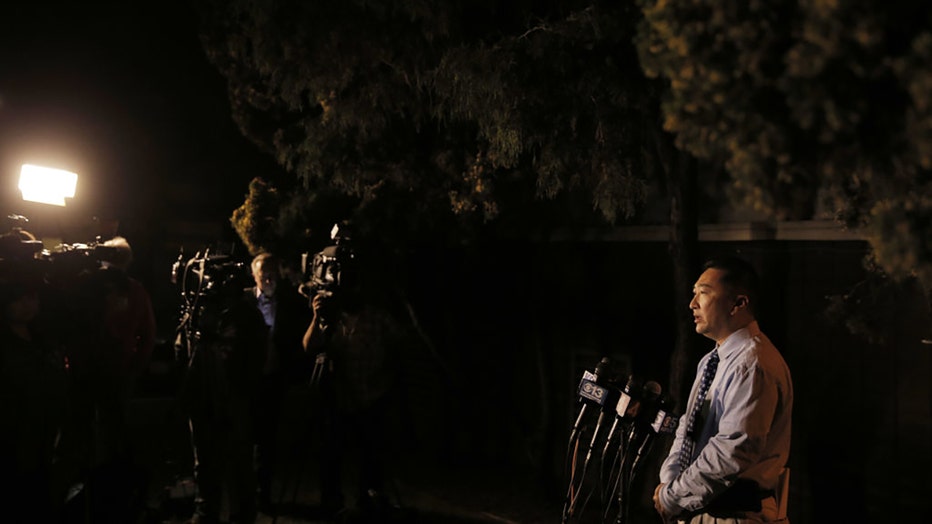
Vallejo Police Lt. Kenny Park updates the media to the status of the search for Denise Huskins on March 24, 2015, at police headquarters in Vallejo, Calif. (Photo by Carlos Avila Gonzalez/The San Francisco Chronicle via Getty Images)
Police said they became suspicious because Quinn waited hours to report the kidnapping. Quinn’s attorney, on the other hand, said the delay in reporting to police was because his client had been bound and drugged.
For Lee, a crime reporter used to interacting with law enforcement, it was a testament to always "take everything with a grain of salt."
"Traditionally reporters, police reporters like myself, we usually think of what police tell us is to be factually accurate, that they have done their due diligence," Lee explained of the infamous police press conference. "If they say it was a hoax, then it must be a hoax. Otherwise, why would they say that?"
The case became dubbed the real-life "Gone Girl" kidnapping in the media, a reference to a popular book and movie about a woman who faked her own kidnapping.
But Quinn and Huskins, who faced intense public ridicule over the false accusations, remained adamant that they were the victims of a horrific crime.
Henry Lee gets more emails: ‘You need to believe Denise. We kidnapped her’
After Huskins turned up in Huntington Beach, and the subsequent claims made by the police department, Lee began receiving more emails from the kidnapper(s). This time, they were seemingly upset that Huskins was being branded as a liar – and wanted their crimes known.
"When I got these emails from the purported kidnapper or kidnappers saying, ‘No, you need to believe Denise. We kidnapped her. It actually happened.’ It's like a confession. It went through exactly what they did or he did," Lee recalled.
"It was just completely bizarre. Someone confessing to a major crime and saying the police have it all wrong," he added.
Lee said the emails got progressively longer and longer, all of which were forwarded to the Vallejo Police Department as part of the investigation.
Matthew Muller: A suspect is caught
It wasn’t until months later that the couple was finally vindicated.
Matthew Muller, a disbarred, Harvard-educated attorney, was arrested on June 8, 2015, in South Lake Tahoe for a home-invasion robbery that occurred in Dublin, a city in the Bay Area.
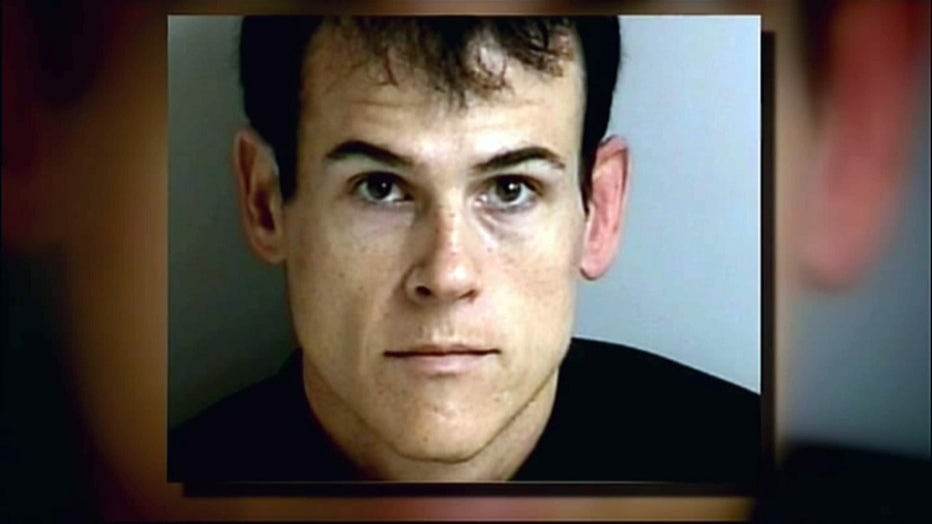
Matthew Muller
The home invasion had similarities to Huskins’ case, a link connected by a "hero" detective with the Dublin Police Department named Misty Carausu.
Investigators found a laptop that resembled one that belonged to Quinn and had been taken.
A stolen car connected to Muller was searched and investigators found several other items, including a water pistol with a flashlight and laser pointer on it, and a pair of goggles similar to the ones Huskins and Quinn said they were forced to wear during the kidnapping.
In the goggles was a strand of long blond hair, the same color as Huskins.
In the Netflix docuseries, Carausu said that the strand of hair led her to believe that there was another victim out there, "and I had to find out who she was."
Carausu and the investigative team also determined that the vehicle’s navigation system history turned up a Huntington Beach address.
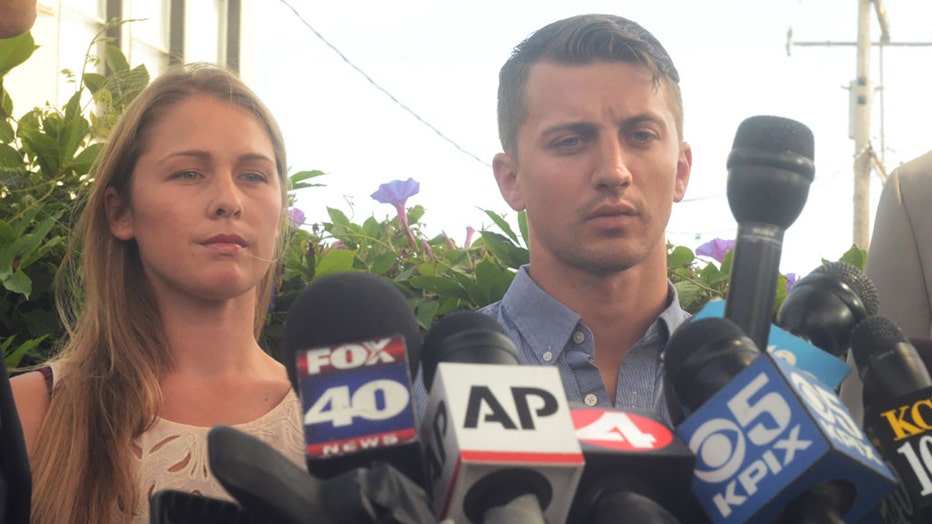
Denise Huskins and Aaron Quinn stand in silence during a press conference on July 13, 2015. (Photo by Chris Riley/MediaNews Group/Vallejo Times Herald via Getty Images)
Carausu, who was inspired to work in law enforcement after a friend became the victim of sexual assault, said she became "more and more emotionally drawn" to the case.
"I wanted to be the one that was the voice for these victims and prosecute the suspects and send them to prison for a very long time," Carausu, who is now a lieutenant with the Alameda County Sheriff's Office, said in the docuseries.
Ultimately, Carausu was credited with helping to link Muller with Huskins’ case.
During Muller’s trial, prosecutors said he used a drone to spy on the couple before he broke into the home with the fake gun, tied them up and made them drink a sleep-inducing liquid. While they were blindfolded, Muller, who was dressed in a full-body wetsuit, played a recording that made it seem as if there was more than one kidnapper, they said.
Muller put Huskins in his trunk, drove her to his home in South Lake Tahoe and held her there for two days. Investigators said they found videos of Muller arranging cameras in a bedroom and then recording himself twice sexually assaulting his blindfolded victim – which Huskins has publicly come forward with and discussed in the docuseries.
Muller ultimately pleaded guilty to the kidnapping and is serving a 40-year prison term.
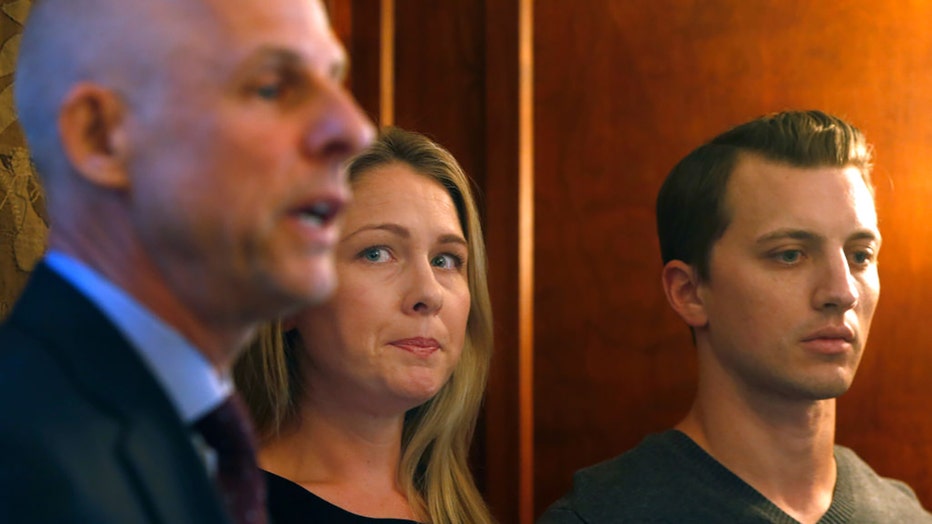
Denise Huskins and Aaron Quinn appear at a news conference with attorney Doug Rappaport (left) in San Francisco, Calif. on Sept. 29, 2016. (Photo By Paul Chinn/The San Francisco Chronicle via Getty Images)
"You have to feel for Denise and Aaron and their families, what they went through, that they were not believed, that they were branded as liars," Lee said. "The media reported what the police said. Now, we know more than ever – You just need to dig and not take anything at face value, or else you might miss the entire truth of the matter."
The aftermath and interviewing Muller in prison
Huskins and Quinn sued the city of Vallejo and its police department for false imprisonment, defamation, false arrest and intentional infliction of emotional distress, and reached a $2.5 million settlement in 2018.
Muller used an anonymous email account to send the messages to Lee claiming that Huskins was abducted by a team of elite criminals practicing their tactics.
Lee later interviewed Muller from prison and noted how outwardly "normal in appearance" he seemed.
"Both in the emails and in the interview with me from jail, he came across as extremely intelligent, extremely smart," Lee recalled. "And that's the scary part, right?
This story was reported from Cincinnati. The Associated Press contributed.

